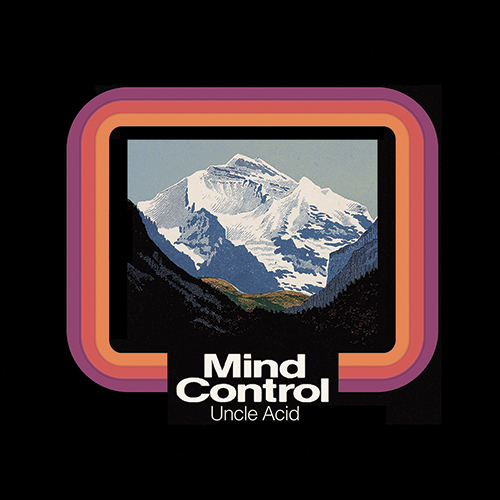Following a band’s catalog from day one is a challenging but mostly rewarding task. Of course, undertaking the task usually requires that you actually like the band. In the case of Uncle Acid and the Deadbeats, the experience is as enriching as any.
Uncle Acid’s second trip

listening to Uncle Acid. Photo © Rise Above Records.
Following a band’s catalog from day one is a challenging but mostly rewarding task. Of course, undertaking the task usually requires that you actually like the band. In the case of Uncle Acid and the Deadbeats, the experience is as enriching as any.
It’s always nice to see an enjoyable band progress through its career, watching as the band starts out without an identity and then matures over time.
Much like raising a child, you get to observe the fledgling act find itself instead of just emulating its peers. This experience can best be described as musical adolescence. Despite the awkwardness of the process, it is only with time and real life experience that a self can be established. Uncle Acid and the Deadbeats certainly fall under this category.
I reviewed Uncle Acid and the Deadbeats’ first album, Blood Lust, in October of 2011 and, back then, I basically equated them to Black Sabbath and chalked the effort up to good but textbook Sabbath worship.
Now, in the spring of 2013, Blood Lust is still good but just as blatantly Sabbath as ever. Since then, Uncle Acid has had the better part of two years to find itself and break away from the riffs that spawned it.
Did Uncle Acid and his lovable Deadbeats accomplish this feat? Was the gestation period long enough?
The answer is mostly yes. The Sabbath influence is still prevalent, but the production and vocal stylings have changed rather dramatically.
Now, on their follow-up, Mind Control, instead of Sabbath (which the band still amply apes) Uncle Acid sounds more like a smoke-soaked Beatles with George Harrison at the helm. Admittedly, I’m not the biggest Beatles fan, but Magical Mystery Tour-era Fab Four with impossibly heavy riffs is a mash-up I can certainly endorse.
No tracks exemplify this new direction better than tracks one (“Mt. Abraxas”) and seven (“Follow the Leader”). Funnily enough, these tracks encapsulate the best and the absolute worst of the aforementioned Beatles era—“Mt. Abraxas” is absurdly well written and executed, while “Follow the Leader” is a plodding mess, complete with wanky sitar splashed across an equally boring accompaniment.
“Mt. Abraxas” is as good an introduction as I’ve heard to any record: It’s a tight, aurally pleasing slab of rock music that pushes you back into your chair and commands you to shut up and pay attention. The riffs on “Mt. Abraxas” and 90 percent of the record are as fuzzed-out as guitar gets, often sounding like fuzzed-out fuzz.
In spots, Mind Control honestly made me think my speakers were broken—I actually checked all my connections when “Mt. Abraxas” raged forth, until Uncle Acid’s vocals sliced through the mix and everything suddenly made sense.
The production of the record is another exhibit in my evidence that record companies are finally “getting it” and mastering metal albums correctly (even if Mind Control isn’t all that much of a metal record).
Once again, the rest of the riffs on the album wash out the vocals, just the way it should be. The riffs are the main focus, and on a stoner-rock record like this they’re the perfect focus, if you ask me.
Some of the riffs on Mind Control are so thick that you’ll wonder if some new recording technique has been invented in order to capture them. Rarely have riffs sounded this raw and jagged, so nasally and gated yet so sludgy and saturated.
Kongh’s Sole Creation is a record I recently said this about, yet the two records differ in their tightness: Kongh’s record sounds polished whereas Uncle Acid embraces the garage-rock aesthetic and instead recalls a time studio glitz didn’t dictate the quality of music.
At the risk of sounding like someone’s mother, Mind Control simply rocks. And while Uncle Acid makes ample use of their rock aptitude, some tracks manage to drop the ball without warning.
“Poison Apple,” the album’s single (if you can call it that), is far too structured and verse-chorus-verse-y to sound like a real Uncle Acid track. Its predictability is jarring when compared to modern rock anthems like “Mt. Abraxas” and the stellar fourth track, “Desert Ceremony.”
Mind Control
Rise Above Records
Out now
✭ ✭ ✭ ✭ ✩
“Desert Ceremony” is a sprawling, ambitious track for any band, let alone one with as focused a sound a Uncle Acid. It’s very post-rock—think This Will Destroy You or Maserati, with generous blues riffing and breathtaking guitar harmonies.
Usually it’s a good sign when metal records have riffs that sound like Mega Man songs. This track and the follow-up “Evil Love” capture this technique wonderfully.
Much like “Follow the Leader,” other tracks stumble a bit. “Death Valley Blues” is kind of boring, and it’s depressing that the two tracks that remain after “Follow the Leader” never really build up a head of steam like the rest of the record.
The last two songs, “Valley of the Dolls” and “Devil’s Work,” almost sound like one dirge that falls flat when compared to the stellar first half of the album.
Overall, watching Uncle Acid transform from Black Sabbath Jr. to its own entity is heartwarming because, while both records are great, Mind Control sounds more like a coming-of-age story than Blood Lust does.
Like a proud father, I encourage you to check out what my boy’s been up to.





